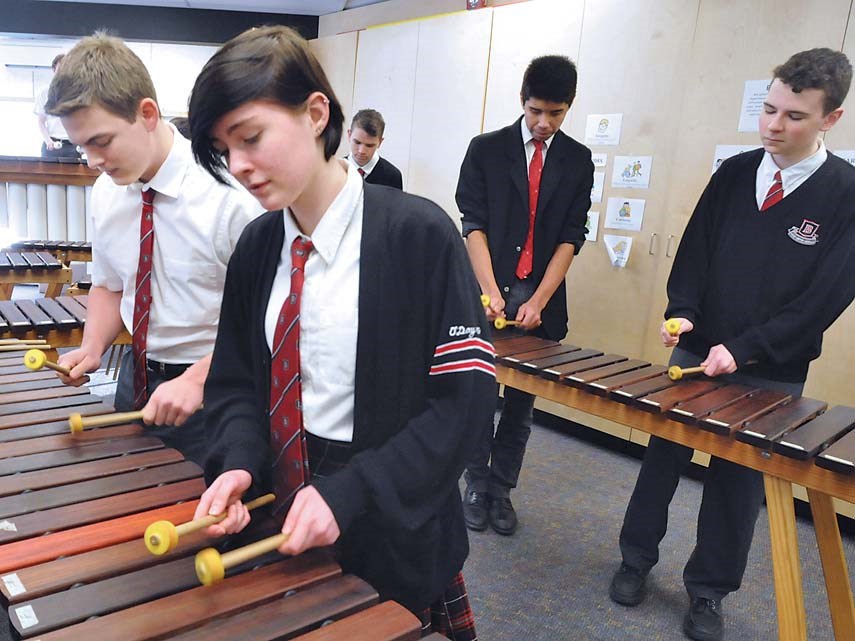“You goof exquisitely. Thank you.”
– Marvin Gaye to
saxophonist Eli Fontaine during the recording of What’s Going On?
Just play around on the piano for a few minutes, she’d told him. Let’s see what you can come up with.
Josh Handford started to play.
It was music class at Brockton Preparatory School on one of those April afternoons when summer vacation feels like an optical illusion that retreats with each step you take toward it.
By Grade 7 Handford had already been writing songs for two years. He cast about the keys that day, searching, searching, and then finding it.
“What I came up with was basically the main motif, or the main riff for the song,” he explains during a brief break from marimba rehearsal.
With the addition of a few intricate cross-rhythms, Handford had penned “Darkness Into Light,” a musical representation of his life as a visually impaired person in a sighted world, he explains.
While introducing the song at a Centennial Theatre performance, he noted the music incorporated feelings of frustration and anger as well as compassion and friendship.
Now in Grade 9, Handford is preparing to bring that song to the stage at Carnegie Hall March 28 as one of 53 musicians in Brockton’s World Music Program.
Brockton is one of four high school (and one university) ensembles from around the world chosen to participate in the 2017 New York Sounds of Spring International Music Festival.
With a little more than one month before curtain call at Carnegie, co-directors Adrian Dyck and Paige Freeborn stand at the threshold of the rehearsal room.
“Welcome to the gong show!” Freeborn calls with a smile.
As the band prepares to launch into a raucous version of “Demons” by Imagine Dragons, Freeborn underlines her shock at the Carnegie Hall gig.
They don’t play Mozart or Beethoven, nor are they a traditional orchestra or choir.
“We travel with 1,000 pounds of African marimbas,” Freeborn says proudly.
From a distance, the group looks like a utopian assembly line. Students bob their bowed heads and sway-dance as much as possible without straying too far from their work.
During this particular rehearsal they’re neat to the point of fastidious.
“Underlined, italicized and bolded in two emails: shirt tucked in,” Freeborn pointedly reminds a musician. “We’re going to Carnegie Hall.”
The group starts playing “The Lion Sleeps Tonight.”
“I’d like to see the stage presence you plan on bringing to Carnegie Hall with you, just unleash it,” Freeborn prompts.
“Be as accurate as you can with your 16ths,” Dyck urges, drumming along with the group from his perch at the front of the room.
The band adjusts and Dyck smiles.
“That’s about as accurate as it can be,” he says.
As the melody drops to a raindrop whisper during the last “li-on sleeps to-night” refrain, the group collectively exhales. A few lean on their marimbas in the universal symbol of percussion fatigue.
With the North Shore News photographer gone, shirts untuck and ties disappear as if by magic.
The playing relaxes accordingly. One boy exchanges a knowing smile with Freeborn following a rare sour note.
For a group awaiting their Carnegie Hall debut, they seem pretty relaxed. The only dissension comes when the musical directors forbid mallet tosses during the Carnegie Hall show.
“You’re most likely to miss on that day,” Dyck says.
In response, one boy immediately throws and drops a mallet, unintentionally proving Dyck’s point.
Some musicians hold the mallets judiciously while others favour a grip that’s part Babe Ruth and part John Bonham, pounding the marimbas like blacksmiths.
Freeborn urges patience, shushing players while speaking through the microphone she and Dyck use to be heard above the high-decibel count.
“Wait for it,” Freeborn urges, as they get a little loud a little too soon. “Don’t give everything away in that first minute.”
Freeborn and Dyck make a point of mentioning the group’s mission statement isn’t about musical excellence but rather fostering compassionate global consciousness through music.
One of the songs they’re planning to bring to Carnegie Hall was forbidden in South Africa during Apartheid.
“It’s a piece of political resistance,” Freeborn reminds the group. “Let’s get our sense of reverence and meaning.”
As the group raises their mallets, Freeborn adds one more instruction: “Don’t forget to breathe.”
. . .
The trip to New York – which includes plans to take in a Broadway show and visit the United Nations – is arranged in part due to a grant from engineering and consulting firm Stantec as well as a few generous parents.
Still, it doesn’t seem to have completely sunk in just yet.
“I’m really excited now … but I feel like … it’s not going to begin to measure up to the actual experience,” Handford says. “I feel like it’s going to hit me when I’m about to walk on stage: ‘Holy crap, you’re playing at Carnegie Hall!’”



